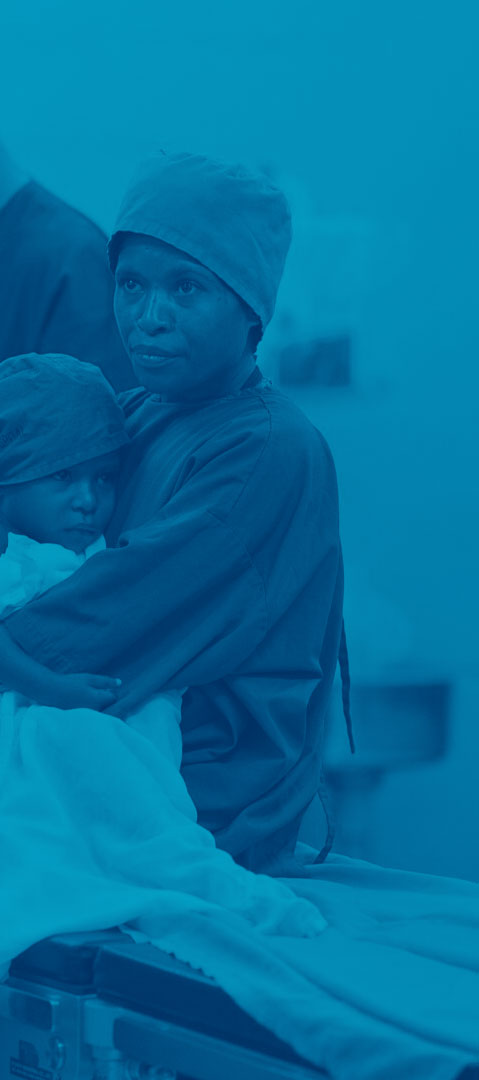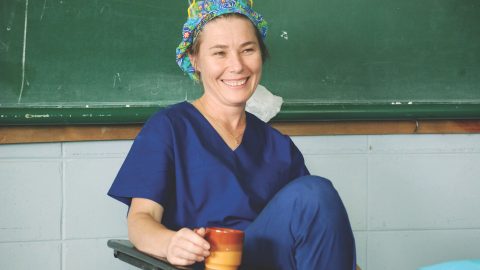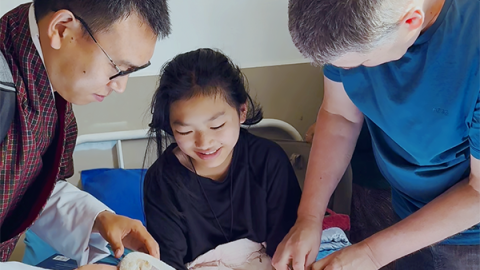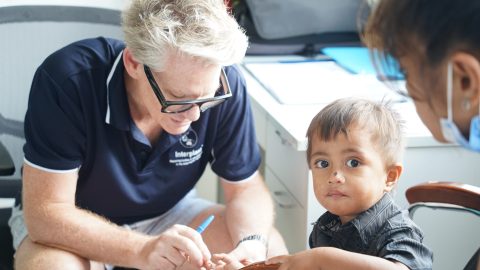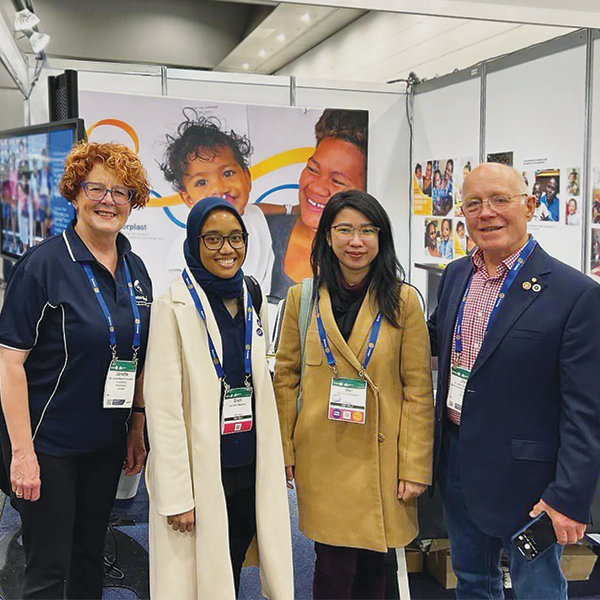
Left to right: Interplast Rotary Coordinator, Janette Etherington, Dr Mumpuni, Dr Karamoy, and Dr John Oswald at the Rotary International Convention in March 2023.
This year, Interplast were honoured to support two talented Anaesthetist Registrars from from Airlangga University in Surabaya, Indonesia to visit Australia in order to access new opportunities to develop and strengthen their clinical skills.
Dr Mumpuni and Dr Karamoy are the 2023 recipients of the Ballarat-Surabaya Anaesthetics Scholarship, established by former Interplast volunteer Dr John Oswald. Through this scholarship, they have participated in the Australian and New Zealand College of Anaesthetists Annual Scientific Meeting in Sydney, and undertaken a series of placements with the Ballarat Health Services and The Royal Children’s Hospital.
New ways of working
Dr Mumpuni and Dr Karamoy were interested in joining the scholarship program to study anaesthetic provision in Australia and learn from working in a different environment. During their placement, the recipients told us that they were exposed to new values and ways of working that they look forward to taking back to their cohort and colleagues.
Dr Mumpuni identified interdisciplinary teamwork as a key takeaway from her experience.
“The teamwork [such as the] discussion between the surgeon, the nurses and also the anaesthetist is good. I think that’s [one of the other things], not only the medical things or the anaesthesia knowledge, that we have to bring back to Surabaya.”
Meanwhile, Dr Karamoy admired “how they treat the patient with such passion… from the heart with such a workload and such a lot of patience.”
These values form the basis of ‘patient-centred care’, which champions teamwork, interdisciplinary collaboration, empathy and respect for all. The recipients described specific examples of these values in action, such as witnessing how the surgeon ensures that patients fully understood their surgery, the hospital allowing for the anaesthetic department to have pre-operative discussions with the patient, and the respect all personnel in the operating theatre had for each role and the suggestions of their colleagues.
Exchanging knowledge
Australian anaesthetists also enthused about what they were able to learn from Dr Mumpuni and Dr Karamoy.
Dr Suh Coh, placement supervisor at the Royal Children’s Hospital, happily told us how “I certainly enjoyed learning about their hospital and what they do in Indonesia as well… and in fact one of our fellows is going to spend some time in Indonesia – so it has been great in setting up a reciprocal relationship too.”
Both recipients also learnt a lot from observing the Acute Pain Service, which is integrated into the anaesthetic department.
Dr Mumpini reported that she took a lot from the time that “one of the pain consultants in Ballarat and RCH invited us to join the chronic pain session in each hospital… [which was] something I never did before. It was really made me think how to do it back in my institution.”
This approach is not widely practiced in Surabaya, and both recipients believe that implementing similar methods will decrease patient stress, empower medical personnel, and lead to better patient outcomes.
Reflecting on the dedication of Indonesian clinicians
Witnessing the advanced equipment and extensive access to anaesthetic drugs used in Australian hospitals allowed them to reflect on how they achieve similar outcomes for patients in Surabaya, a setting with limited access to anaesthetic drugs and other resources.
Dr Mumpuni also felt a renewed pride for her home country and collegues. “We are I think in Surabaya… more powerful because we don’t have much choices of drugs but we can do it. And in here [Australia] you have a lot of, you know, choices. And you have a lot of equipment…That’s one that makes me proud sometimes… [because you have] more drugs but [even with] limitations we can do the same as you.”
The dedication and resourcefulness of our partners keeps people alive, reduces their pain and increases their ability to participate fully in their communities. Through programs and scholarships, Interplast will always support the learning and resourcing of partner staff, so they can look after their communities with nothing standing in their way.
Acknowledgements
Our thanks to Dr John Oswald, for his support of the Ballarat-Surabaya Scholarship, and the Australian and New Zealand College of Anaesthetists for their support of our scholarship recipients through the Global Health Equity Grant.
You can find out more about sponsoring a scholarship and supporting the next generation of medical leaders on our Scholarships page.
